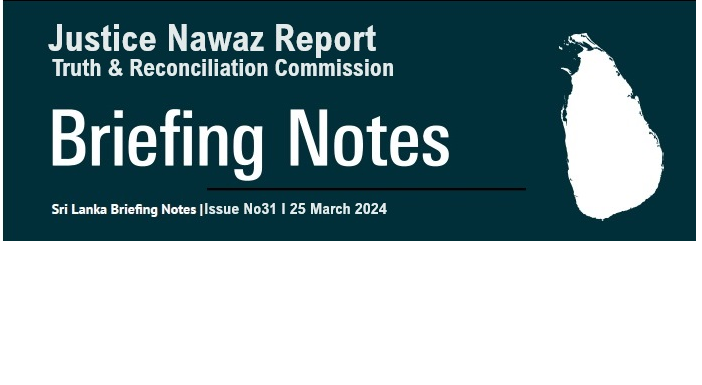This Briefing Note is limited to the contours proposed by the 624-page volume one of the PCOI report with regard to the Truth and Reconciliation Commission (TRC) to be established in Sri Lanka.
INTRODUCTION
Over the decades since 2001, the government of Sri Lanka has appointed a number of Commissions of Inquiry to investigate serious human rights violations. Those violations include anti-Tamil programs, disappearances, war crimes etc.
Those commissions faced criticism from various quarters, including human rights organizations and international observers, for perceived shortcomings in terms of independence, impartiality, transparency, and effectiveness.
As the GOSL lacked genuine commitment to accountability and reconciliation, the implementation of recommendations from these commissions has been partial, slow and zero.
The main challenges to implementing these recommendations include political resistance, lack of political will, institutional barriers, and ongoing ethnic tensions.
Overall, the failure to fully implement those recommendations has contributed to ongoing concerns about impunity for human rights violations in Sri Lanka and has hindered efforts to achieve lasting peace and reconciliation.
Table of Contents
TRUTH & RECONCILIATION COMMISSION.. 5
The overriding goal of the commission. 6
Powers of proposed for the TRC. 7
Independence of Commissioners. 9
Violations of IHL and IHRL. 10
Limited Role for International Experts. 10
Deaths of Isaipriya, Colonel Ramesh and Balachandran Prabhakaran. 12
Command responsibility of violations. 13
The possible fate of the recommendations. 13
Sri Lanka Brief thanks Sri Lanka Advocacy Group – Germany for their continued support for Sri Lanka Brief publications.
Read the full report ad s PDF :Sri Lanka Briefing Note 31 Nawaz Report on TRC 250324
Read the full report as a Word document: Briefing Note 31 Nawaz Report and TRC 25.03.24
